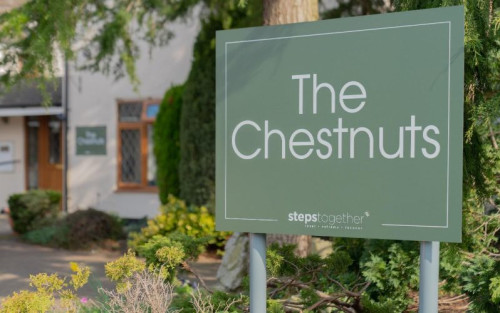
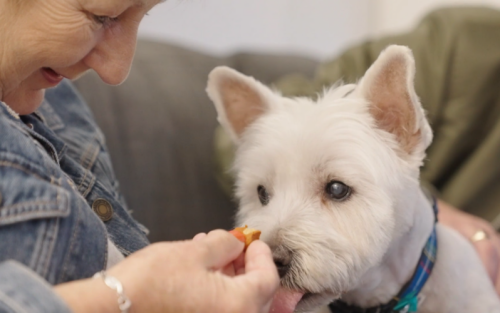
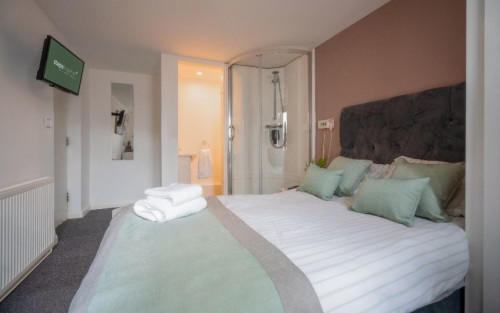



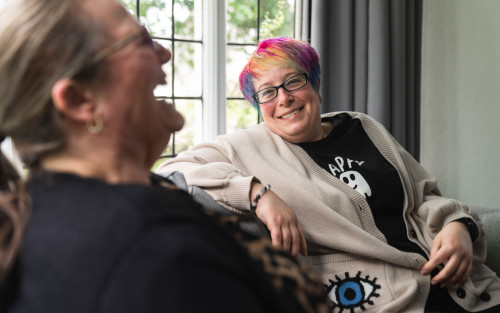
Steps Together - The Chestnuts
Verified Center
This provider's information has been quality-checked by Recovery.com's Research Team for accuracy and completeness, including center verification through appropriate third-party organizations.
Treatment Focus
This center treats substance use disorders and mental health conditions. You'll receive individualized care catered to your unique situation and diagnosis, learn practical skills for recovery, and make new connections in a restorative environment.
Primary Level of Care
Offering intensive care with 24/7 monitoring, residential treatment is typically 30 days and can cover multiple levels of care. Length can range from 14 to 90 days typically.
Treatment Focus
This center treats substance use disorders and mental health conditions. You'll receive individualized care catered to your unique situation and diagnosis, learn practical skills for recovery, and make new connections in a restorative environment.
Primary Level of Care
Offering intensive care with 24/7 monitoring, residential treatment is typically 30 days and can cover multiple levels of care. Length can range from 14 to 90 days typically.
Provider's Policy
Please ensure you check your insurance provider about the level of coverage before you reach out to Steps Together. All admissions via Health Insurance Coverage must be pre-authorised by both the insurer, the client, and the admissions team at Steps Together. Whilst Steps Together work alongside Healthcare Insurance providers, individual eligibility for payment coverage is determined by the insurer themselves, not The Steps Together Group. The process for obtaining detoxification or rehabilitation treatment does often vary between each Healthcare Insurance provider, however please see below a rough process guide. Admission to Steps Together via Insurance Coverage Call the Healthcare Insurer directly to confirm policy coverage, policy level and your eligibility for treatment. Obtain referral from Healthcare Insurer to a member of the team at Steps Together. Our medical team will then determine eligibility and approve your details with the Healthcare Insurer, if appropriate. Steps Together will then receive authorisation from the Healthcare Insurer to admit you into treatment. Our admissions team from Steps Together will then complete a standard telephone pre-assessment with you, and finalise date and time of admission.
Steps Together - The Chestnuts
Steps Together - The Chestnuts
About Steps Together - The Chestnuts
Established in 2017 and led by a team with over 20 years of experience in the addiction treatment, Steps Together is committed to helping individuals and their families struggling with addiction, anxiety, depression, stress, and other non-acute mental health conditions. Steps Together offers a combination of residential and outpatient therapy in luxury residential settings. The Chestnuts estate is just 1 of 5 locations Steps Together offers. They work with insurance providers and provide a full continuum of care with detox, residential, and aftercare services.
A Holistic, Personal Approach
Steps Together’s approach rests on 3 pivotal pillars: reset, reframe, and recover. Clinical detoxification allows clients to reset, and therapeutic care helps reframe thinking and sets clients up for long-term recovery. During treatment, Steps Together takes a personalised approach to recovery, offering client-centered therapy like individual talk therapy, art and music therapy, 12-Step groups, and mindfulness. They address substance and behavioral addictions like gambling, pornography, and over working. The mental health conditions they treat include anxiety, stress, depression and low mood, burnout, trauma, post-traumatic stress disorder (PTSD), obsessive compulsive disorder (OCD), personality disorders, and attention-deficit hyperactivity disorder (ADHD). However, Steps Together does not treat complex or acute mental health conditions, ensuring effective care for non-severe issues that can be managed with regular therapy and support.
Expert Staff and a Variety of Treatment Options
Compassion and expertise drive the staff at Steps Together. Their combined experience makes them highly qualified in addiction and mental health treatment, clinically and therapeutically. Clients at The Chestnuts receive detox as needed, led by clinicians for comfort and safety. Residential treatment includes 1:1, group, and family therapy, along with a dedicated room for holistic wellbeing.
Private, Luxurious Living and Aftercare
The Chestnuts is tucked away in a peaceful, rural location in Arnesby Village. Their welcoming home boasts tasteful decor and large social spaces, including a grand dining room, a fully equipped gymnasium, private therapy rooms, beautiful treatment lounges, and an outdoor courtyard with a barbeque area. Steps Together provides 13 private bedroom suites and 2 executive double rooms, along with gourmet meals and refreshments prepared by in-house chefs that can accommodate specific dietary needs. Daily housekeeping and laundry services are also provided. After treatment, clients can attend weekly aftercare groups (in-person or virtually) and free monthly family workshops.
Private-Pay Facility Accredited by the CQC
Steps Together is a private pay residential facility. Notably, they are regulated by the Care Quality Commission (CQC) to offer effective and safe treatment programs in comfortable, luxury environments.

Highlights from the Center
Highlights
These highlights are provided by and paid for by the center.
Therapeutic Location
Holistic Approach
Licensed for Both Addiction & Mental Health
Dietary Accommodations
Center Overview
Treatment Focus
This center treats substance use disorders and mental health conditions. You'll receive individualized care catered to your unique situation and diagnosis, learn practical skills for recovery, and make new connections in a restorative environment.

Insurance Accepted
Pricing and Program Length
Estimated Center Costs
The cost listed here (£3,570/week), is an estimate of program cost. Center price can vary based on program and length of stay. Contact the center for more information. Recovery.com strives for price transparency so you can make an informed decision.
Meet Your Care Team

Darren Rolfe
Chief Executive & Founder

Steve Jones
Deputy CEO
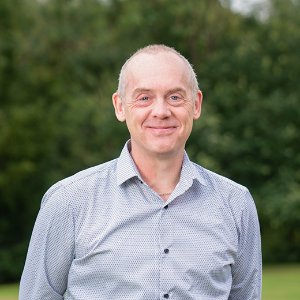
Paul Mudie
Group Operations Director

John Wilson
Group Therapy Services Director

Cathy Hall
Group Clinical Services Director

Jackie Wilkinson
Service Manager

Dr. Akif A. Khan
Lead Consultant Addictions / General Psychiatry

Kerry Drew
Senior Treatment Advisor

Faith Caine
Finance Officer

Chantelle Bradshaw
Marketing & Brand Manager




Levels of Care








Your Care Options
Specializations
Alcohol
Using alcohol as a coping mechanism, or drinking excessively throughout the week, signals an alcohol use disorder.
Anxiety
Anxiety is a common mental health condition that can include excessive worry, panic attacks, physical tension, and increased blood pressure.
Detox
Detox fully and safely removes toxic substances from the body, allowing the next steps in treatment to begin with a clean slate.
Burnout
Burnout entails mental and physical exhaustion, and leads to a severe lack of fulfillment. This condition is often caused by overwork.
Drug Addiction
Drug addiction is the excessive and repetitive use of substances, despite harmful consequences to a person's life, health, and relationships.
Family Therapy
Family therapy addresses group dynamics within a family system, with a focus on improving communication and interrupting unhealthy relationship patterns.
Licensed Primary Mental Health
Some primary care providers offer mental health diagnosis and treatment. This can prevent patients from developing more serious conditions.
Residential
In a residential rehab program, patients live onsite, with access to daily treatment and 24-hour care. An average stay is 30-90 days.
Who We Treat
Older Adults
Addiction and mental health treatment caters to adults 55+ and the age-specific challenges that can come with recovery, wellness, and overall happiness.
Executives
Executive treatment programs typically directly support the needs of people who manage businesses and may provide flexible schedules and office space to allow work during treatment.
Young Adults
Emerging adults ages 18-25 receive treatment catered to the unique challenges of early adulthood, like college, risky behaviors, and vocational struggles.
LGBTQ+
Addiction and mental illnesses in the LGBTQ+ community must be treated with an affirming, safe, and relevant approach, which many centers provide.
Men and Women
Men and women attend treatment for addiction in a co-ed setting, going to therapy groups together to share experiences, struggles, and successes.
Midlife Adults
For adults ages 40+, treatment shifts to focus on the unique challenges, blocks, and risk factors of their age group, and unites peers in a similar community.
Mild Disabilities
Adults with mild physical or intellectual disabilities receive treatment catered to their specific needs in a safe and clinically supportive environment.
Approaches
Evidence-Based
A combination of scientifically rooted therapies and treatments make up evidence-based care, defined by their measured and proven results.
Holistic
A non-medicinal, wellness-focused approach that aims to align the mind, body, and spirit for deep and lasting healing.
Individual Treatment
Individual care meets the needs of each patient, using personalized treatment to provide them the most relevant care and greatest chance of success.
Twelve Step
Incorporating spirituality, community, and responsibility, 12-Step philosophies prioritize the guidance of a Higher Power and a continuation of 12-Step practices.
Therapies
1-on-1 Counseling
Patient and therapist meet 1-on-1 to work through difficult emotions and behavioral challenges in a personal, private setting.
Meditation & Mindfulness
A practiced state of mind that brings patients to the present. It allows them to become fully aware of themselves, their feelings, and the present moment.
Trauma-Specific Therapy
This form of talk therapy addresses any childhood trauma at the root of a patient's current diagnosis.
Online Therapy
Patients can connect with a therapist via videochat, messaging, email, or phone. Remote therapy makes treatment more accessible.
Mindfulness Therapy
This ancient practice can be mental, emotional, and even spiritual. In meditation, you focus your attention on the present moment without judgement.
Attachment-Based Family Therapy
ABFT is a trauma-focused therapy that teaches you to form healthy relationships by rebuilding trust and healing attachment issues formed in childhood.
Art Therapy
Visual art invites patients to examine the emotions within their work, focusing on the process of creativity and its gentle therapeutic power.
Conditions We Treat
Pornography Addiction
A person with a porn addiction is emotionally dependent on pornography to the point that it interferes with their daily life and relationships.
Grief and Loss
Grief is a natural reaction to loss, but severe grief can interfere with your ability to function. You can get treatment for this condition.
ADHD, ADD
ADHD is a common mental health condition caused by dopamine imbalance. Common symptoms include inattention, hyperactivitiy, and impulsivity.
Anger
Although anger itself isn't a disorder, it can get out of hand. If this feeling interferes with your relationships and daily functioning, treatment can help.
Anxiety
Anxiety is a common mental health condition that can include excessive worry, panic attacks, physical tension, and increased blood pressure.
Burnout
Burnout entails mental and physical exhaustion, and leads to a severe lack of fulfillment. This condition is often caused by overwork.
Codependency
Codependency is a pattern of emotional dependence and controlling behavior. It's most common among people with addicted loved ones.
Depression
Symptoms of depression may include fatigue, a sense of numbness, and loss of interest in activities. This condition can range from mild to severe.
Substances We Treat
Alcohol
Using alcohol as a coping mechanism, or drinking excessively throughout the week, signals an alcohol use disorder.
Benzodiazepines
Benzodiazepines are prescribed to treat anxiety and sleep issues. They are highly habit forming, and their abuse can cause mood changes and poor judgement.
Chronic Relapse
Consistent relapse occurs repeatedly, after partial recovery from addiction. This condition requires long-term treatment.
Co-Occurring Disorders
A person with multiple mental health diagnoses, such as addiction and depression, has co-occurring disorders also called dual diagnosis.
Cocaine
Cocaine is a stimulant with euphoric effects. Agitation, muscle ticks, psychosis, and heart issues are common symptoms of cocaine abuse.
Drug Addiction
Drug addiction is the excessive and repetitive use of substances, despite harmful consequences to a person's life, health, and relationships.
Ecstasy
Ecstasy is a stimulant that causes intense euphoria and heightened awareness. Abuse of this drug can trigger depression, insomnia, and memory problems.
Heroin
Heroin is a highly addictive and illegal opioid. It can cause insomnia, collapsed veins, heart issues, and additional mental health issues.
Psychedelics
Hallucinogenic drugs—like LSD—cause euphoria and increased sensory experiences. When abused, they can lead to depression and psychosis.
Languages
Aftercare
Care Designed for Your Needs
Personal Amenities
Amenities
Special Considerations
Center Pets
Addiction and mental health facilities with pets allow patients to interact with friendly dogs, cats, horses, and in some cases, even dolphins.
Pet Friendly
For greater comfort and healing, pet-friendly treatment centers welcome dogs and animal companions to stay with their owners while they attend treatment.
Executive Program
Addiction and mental health treatment for executives typically involves high discretion, greater technology access, and more private, 1-on-1 care.
Activities
Yoga
Yoga is both a physical and spiritual practice. It includes a flow of movement, breathing techniques, and meditation.
Off-Site Activities
Off-Site Amenities

What people are saying
Treatment
0.5
Accommodations
0.5
Food & Nutrition
4.0
Value
0.5
Anonymous
Treatment in 2024 • (14 days) • Reviewed 08/16/24
Former Client
•Middle East
Steps Together - The Chestnuts





